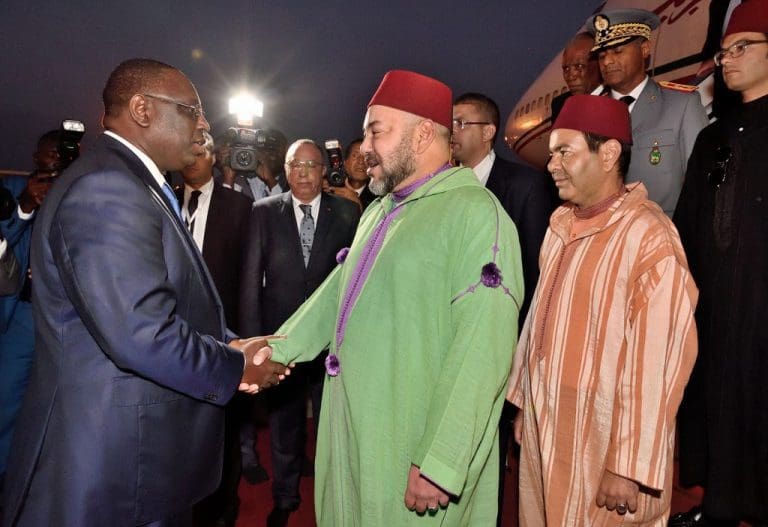Almost seven years after his last visit to Senegal, the king of Morocco is in Dakar for a visit that heralds Rabat’s growing interest in African countries.
APA-Dakar (Senegal) By Abdourahmane Diallo
Moroccans living in Senegal have been preparing for his visit with enthusiasm.
He left his native Morocco 40 years ago to join his parents who have lived in Senegal since the late 1950s.
Mohamed Yaddas, now in his 60s and a textile merchant at the popular Dakar market of Tilene, has been preparing for several days to celebrate the new visit of King Mohammed VI to Senegal, which is slated to begin on Wednesday, February 22.
The visit is one of the various trips the Moroccan monarch pays to Senegal after his accession to the throne in July 1999 following the death of his father King Hassan II who ruled Morocco for nearly 40 years.
Like other Moroccans living in Senegal, Yaddas has prepared red flags with the green star to welcome the monarch.
“I know about the visit of his majesty, King Mohammed VI. I am part of the Moroccans who welcomed him during his first visit to Senegal in 2001. I was honoured,” says the merchant who collaborated for a while with the Moroccan embassy in Dakar before “retiring” to resume his commercial activities in Tilene.
“Our activities are going very well in Senegal. We are not disoriented. Senegal and Morocco are one country. We are at home here as the Senegalese are at home in Morocco. It is only the borders that separate us,” emphasises the one who claims to be “a Senegalese at heart.”
In the heart of the city, on Mohammed V Street, named after the grandfather of the current king who died in 1961, the oldest Moroccan business lane in Dakar, Ahmed Salamoun is also enthusiastic about the idea of seeing his king in Senegal.
“It has been a long time since we have seen our king in Senegal. We welcome him,” says the old shopkeeper between two mouthfuls of a cigarette on which he pulls hard as if to banish the painful memory of the Covid-19 pandemic that has affected his business.
“Covid-19 and the war in Ukraine somehow disrupted our business. But we thank God. Mohamed V Street is home to about 20 Moroccan traders. I have compatriots who are in the districts of Grand Yoff, HLM etc.,” he explains.
In Senegal, as in other African countries, the Moroccan presence is not limited to the Dakar merchants of Tilene or Mohamed V Street. It also concerns banks, such as Attijariwafa Bank, the pharmaceutical industry with West Afric Pharma, insurance or the building and real estate sector with the Addoha Group.
This company has led in Senegal, the construction project of the “City of Emergence” planned to house a set of 17 ten-storey buildings each on an area of 25,000 square meters for some 700 apartments of different standings, for an investment of 45 billion CFA francs.
“The banks are the foundation of the Moroccan economy in Senegal. They have played a great role in encouraging and securing investments of Moroccan companies in Senegal. At the same time, they are also accompanied by insurance companies. Now Morocco has a great experience in banking and at the same time in insurance. Also in the agricultural field, there are quite a few Moroccan companies involved in the development of a green Senegal,” says Mohamed Lahlou, president of the Club of Moroccan Investors in Senegal (CIMAS) in 2019.
This was on the occasion of the celebration of the 20th anniversary of the accession to the throne of King Mohammed VI, who is the architect of the current dynamism showed by Rabat across Africa.
In 20 years of reign, the successor of Hassan II has made nearly 50 visits to the continent.
Under his leadership, more than a thousand agreements have been signed between Morocco and dozens of African countries, compared to just over 500 between 1956, the date of the kingdom’s independence, and 1999, the year of his enthronement.
During this time, dozens of private Moroccan companies have set up operations south of the Sahara.
After he came to power, King Mohamed VI has also multiplied diplomatic actions through the opening of new Moroccan representations in countries previously overlooked.
In addition, there has been a mobilisation of religious networks historically linked to the kingdom, such as the Sufi brotherhoods widely established throughout the southern Sahara.
ODL/Los/ac/fss/as/APA


